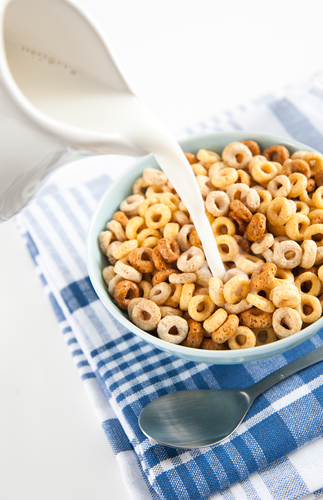Are Cheerios Bad For You?
Short answer
Cheerios aren't as healthy as many believe. While General Mills, the company that produces the cereal, claims that Cheerios promote heart health and lower cholesterol, these claims are basically unfounded. Not to mention, Cheerios are filled with modified ingredients and preservatives.
Recommended Alternative
Harmful to your health. A few benefits may be associated, but the bad outweighs the good. Moderation is extremely important.
View Full Grading System
Category 'A'
Very healthy and numerous health benefits. Side effects are rare. Things rated an 'A+' are typically necessary for survival (for example, water).
Very healthy and numerous health benefits. A few harmful qualities may be associated, but only under certain circumstances such as an allergic reaction.
Very healthy and numerous health benefits. Harmful qualities may be associated, but aren't usually serious.
It is important to note that even the best things in life can become bad in immoderate amounts. So, although something may be rated an 'A+', overconsumption/overdoing can bring unwanted effects.
Category 'B'
Very beneficial to your health. Things rated a 'B+' may have a few harmful qualities to pay attention to.
Overall beneficial to your health. Things rated a 'B' may have some harmful qualities to pay attention to.
More beneficial to your health than not. However, harmful qualities are most likely associated and shouldn't be overlooked.
The main difference between category 'A' and category 'B' is the harmful qualities typically present in 'B' items. Serious side effects are usually uncommon, but are still possible and should be taken note of.
Category 'C'
Both beneficial and harmful qualities associated. Things rated a 'C+' are typically a bit more on the beneficial side. Still, moderation is important.
A fairly even ratio of beneficial and harmful qualities. Moderation is important. Very general topics that can lean towards both sides of the spectrum will be placed here as well. Rice, for example, can be good or bad depending on the type.
More harmful than beneficial. Side effects are common, especially when consumed/done excessively. Moderation is very important.
Category 'C' usually denotes to both good and bad qualities. When it comes to this category, it is important to keep this word in mind: moderation.
Category 'D'
Harmful to your health. Although benefits may be associated, the bad most likely outweighs the good. Moderation is very important.
Harmful to your health. A few benefits may be associated, but the bad outweighs the good. Moderation is extremely important.
Harmful to your health. Very few, if any, benefits are present. Things in this category should be avoided as much as possible.
Category 'D' is typically for things that are more harmful than beneficial. While consuming/doing something unhealthy once in a blue moon shouldn't hurt, we definitely recommend eliminating 'D' items as a regular part of your routine/diet.
Category 'F'
Category 'F' is for things that fail to bring anything beneficial to the table, and are very harmful to your health. We recommend completely avoiding anything in this category. Long-term side effects of 'F' items are usually very serious.
Category 'N'
'N' stands for neutral. Things placed into this category are generally (a) neither good nor bad for you, or (b) lack the necessary evidence to reach any conclusions.
Long answer
For years, General Mills has been marketing Cheerios with a campaign claiming that the breakfast cereal offers health benefits like improving heart health and reducing cholesterol. The brand is advertised as being a healthy and wholesome alternative to sugary cereals. While the marketing effort has done wonders to convince consumers to add Cheerios to their diet, the list of ingredients on each box shows that they may not be the healthiest breakfast option.
The heart healthy claim made by Cheerios is based on the cereal being made from whole grains. Whole grains offer essential nutrients to cells and provide soluble fiber which can help to reduce cholesterol. However, during the production process, the grains are manipulated with heat, pressure, and chemicals to such an extent that most nutritional value is lost. In addition to losing the value of the fiber contained in the cereal, each serving also contains a significant amount of sugar. For example, the multigrain variety of Cheerios contain 6 grams of sugar for each one cup serving. Other flavors, like chocolate and peanut butter, contain even more sugar in a smaller serving size.
If the cereal doesn't offer health benefits, why is company allowed to make the healthy breakfast claim in advertising and online? The FDA regulations about these claims are very lax. Companies can recommend their product as part of a healthy diet, as long as they include the caveat that the product should be eaten along with a healthy diet of fruits, vegetables, and whole grains.
Possible short-term side effects
Possible long-term side effects
- weight gain
-
diabetes
-
weakened immune system
-
elevated blood sugar
Ingredients to be aware of
Healthier alternatives
- organic cereals
-
fresh fruits
-
organic rolled oats
-
shredded wheat
Our Wellness Pick
(what is this?)
Barbara's Morning Oat Crunch
- Heart-healthy cereal
- Rich in fiber
- Non-GMO verified
- 14 Oz box
- Deliciously crunchy
Learn More!
Please turn your Ad Blocker off to see this content. Thank you!
Thank you for your feedback!
Written by Kathan Natrajan
Published on: 12-28-2015
Last updated: 12-15-2023
Thank you for your feedback!
Written by Kathan Natrajan
Published on: 12-28-2015
Last updated: 12-15-2023

 Approved by
Approved by 















